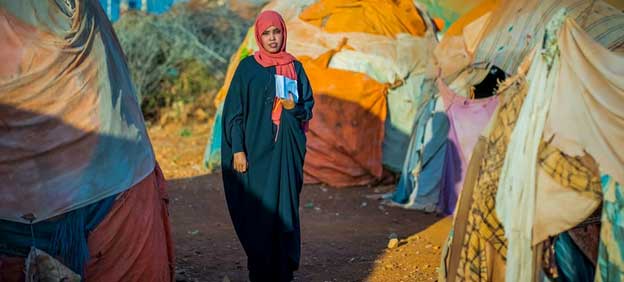International Women’s Day, 2022 - To Overcome Africa’s Development Crisis, Invest in Strengthening Girls’ Power

JOHANNESBURG, Mar 07 (IPS) - The following opinion piece is part of series to mark International Women’s Day, March 8. It was on a visit to Lesotho that I first heard the derogatory term Mmutla – nocturnal hare. It is a word used in some southern districts to insult adolescent girls who have been forced into sexual exploitation and transactional sexual relations for survival.
That one cruel word summed up the multiple marginalisations faced by so many adolescent girls across sub-Saharan Africa: excluded for being poor, for being female, for being young; excluded further through exploitation, and then excluded further as they get blamed for that exploitation.
On our continent, one in four adolescent girls in a relationship have experienced physical and/or sexual violence from their partner, and over a third of girls are married while still children.
The consequences are seen in the unrelenting young female HIV pandemic. In West and Central Africa, 82% of new HIV infections within the age group 15-19 years are of girls. In the East and Southern Africa region, that figure rises to 85%.
On visits to Lesotho, South Africa, Senegal and Malawi, I’ve heard from the public and private sector, from civil society organizations, from traditional and religious leaders, and teenagers in and out of school, including teenage mothers, the same message: if Africa is to fulfil its potential, it has to enable all of its girls to fulfil theirs. And that depends on all girls completing school and being empowered at school.
Evidence shows that completion of secondary education by adolescent girls can reduce HIV infection by up to 50%. A layered approach to interventions that combines completion of secondary education with universal access to comprehensive sexuality education, fulfilment of sexual and reproductive health and rights, ensuring that school environments are free from gender-based and sexual violence, and successful school-to- work transitions for economic security and empowerment, will lower the risk of HIV infection even further.
Communities concur on the main reasons why so many girls do not complete secondary school. The cost of education is cited as a key barrier everywhere I visit. Even when fees are removed, charges for “school development”, or for exams or text books or uniforms keep many girls out. In addition, discriminatory policies, laws and practices (both at school and in the community) deny girls their right to education and entrench inequalities, poverty, quality and relevance of education. Adolescent girls with disabilities, those from rural settings, low-income and child-headed households as well as those from marginalized groups are at a significantly elevated risk of sexual exploitation and abuse, violence and teenage pregnancies.
The COVID-19 pandemic has turned a chronic challenge into an acute one. For instance, the restrictions imposed to curb the spread of COVID19 led to school closures, disruptions to health and social services, and job losses in households. With the protective cover of school pulled back, huge spikes have been recorded in teenage pregnancies, child marriage, gender-based and sexual violence, and sexual exploitation. Millions of girls may not ever return to school.
Fixing such a crisis depends on a whole-of-society commitment. It is that recognition which has brought together allies from across the African continent and beyond in the Education Plus Initiative – a high-level political advocacy drive and broad-based campaign, co-led by the Executive Directors of UNAIDS, UNESCO, UNFPA, UNICEF and UN Women. It leverages and combines the mandates, expertise, knowledge, skills and impact of five UN agencies, and brings in too the insights and determination of civil society organizations, adolescent girls and young women, youth and feminist networks.
Unequal gender power dynamics and harmful gender norms – compounded by intersecting forms of discrimination based on income, education, and disability – drive the risks girls face. These risks help drive the HIV pandemic, which, in turn, further exacerbates these inequalities. There is no way to succeed in ensuring that girls are safe and healthy unless they are empowered. As this year’s International Women’s Day theme notes, we need gender equality today for a sustainable future tomorrow.
Gender inequalities are systemic, and can only be countered with social mobilization, bold policy reform and scaled-up financing.
Every group of girls I meet on this continent teaches me something new, but they all remind me of one key lesson that we need all decision-makers to align their policies and their investments to: Everything we do to give girls a fair chance, they will give us back so much more in return.
Africa’s girls are the ones who will ensure that our development goals are realized. All they ask is that we ensure that they are schooled, safe and strong.
Caroline Ngonze manages Education Plus, a movement for the education and empowerment of every adolescent girl and young woman. You can read more about Education Plus here https://www.unaids.org/en/topics/education-plus
Follow @IPSNewsUNBureau
Follow IPS News UN Bureau on Instagram
© Inter Press Service (2022) — All Rights Reserved. Original source: Inter Press Service
 Global Issues
Global Issues